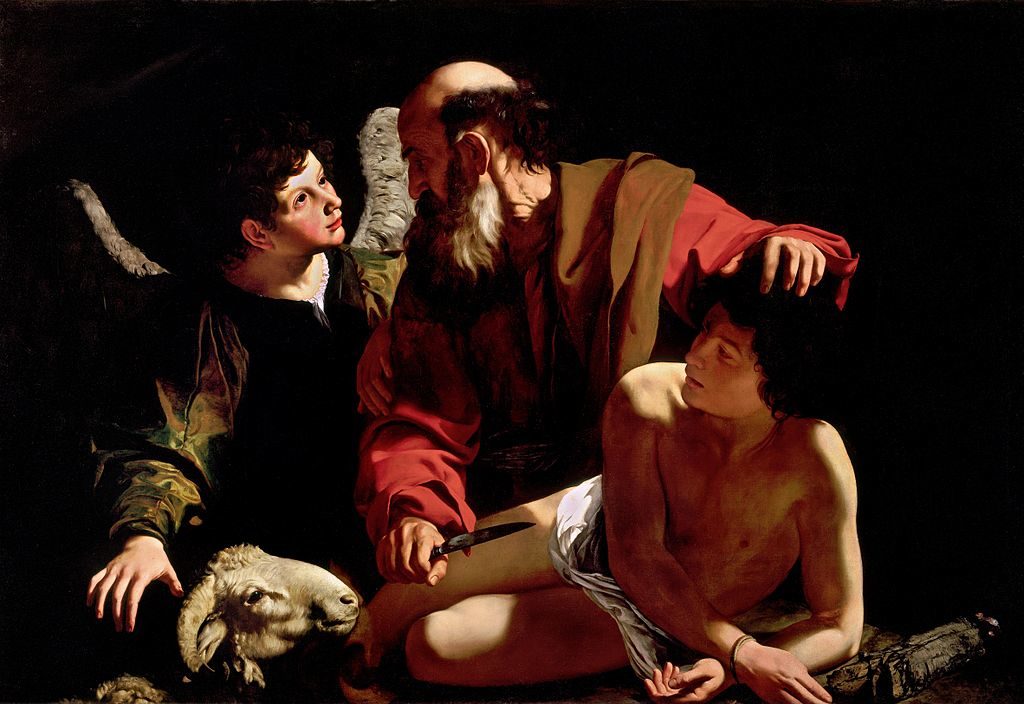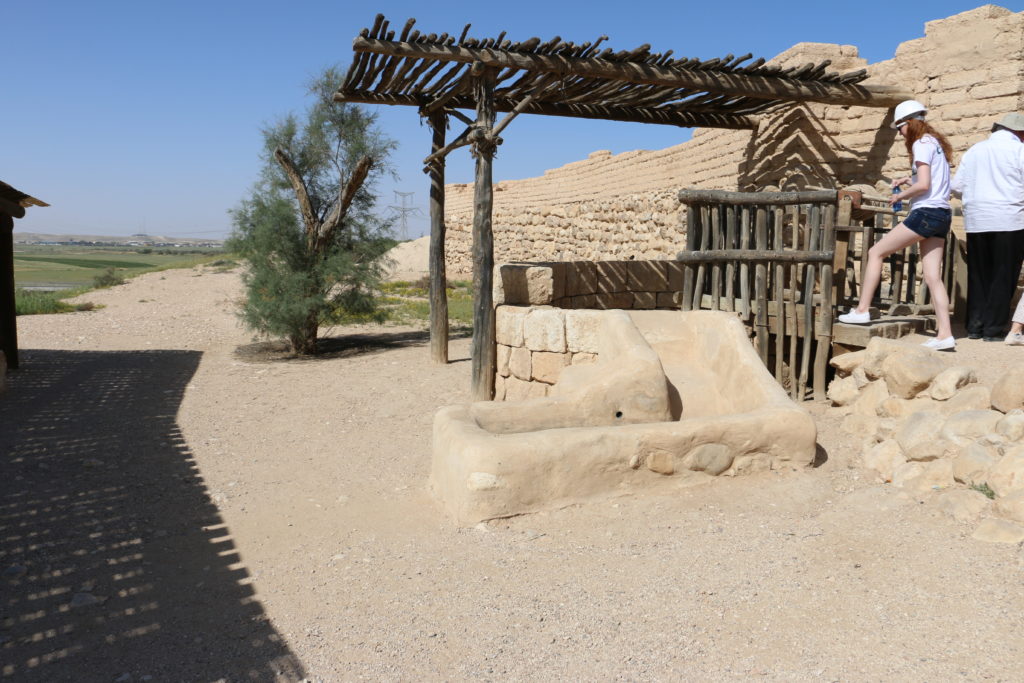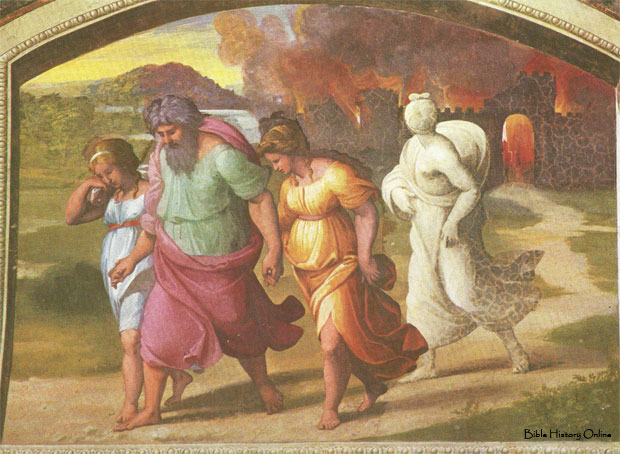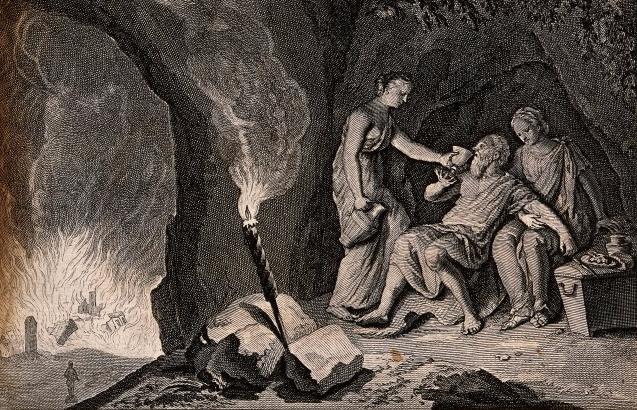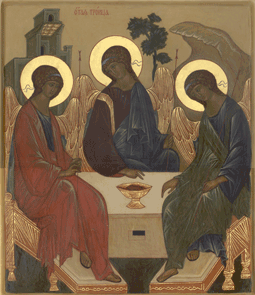Bible Reading Challenge Blog
January 21, 2018: Day 27 – Genesis 27
January 22, 2018We find ourselves at the climax of the story where Isaac is deceived into blessing his youngest son, Jacob. Remember, it is his wife, and the mother of both of these children, who really takes the lead on deceiving her husband so that the youngest son will get the blessing. One aspect of it which caught my attention this time is that when Jacob balks and says: I don’t really want to do this because if I am found out I may receive a curse instead of a blessing, mom jumps right in and says: don’t worry, the curse will be on me if that happens.
It doesn’t happen, everything goes as they planned it, Isaac blesses Jacob, Esau is distraught and as a result plans on killing his younger brother. Okay, that last part was not a part of the plan. It is important that we see that this is the stage where they leave each other. Esau is enraged and wants to kill Jacob. Jacob is told to leave the compound and runs away to his Uncle Laban’s house to get away from Esau who wants to kill him. Once we transition to focusing on Jacob, this part of the story will be important because we see another side of Esau come out. He hasn’t left just yet, and we see an interesting twist to the story in the next chapter before he leaves. The mother-in-law complains again to her husband about the daughters-in-law. I wonder if husband Isaac knows the role that wife played in the deception.
January 20, 2018: Day 26 – Genesis 26
January 22, 2018We see that the apple doesn’t fall too far from the tree. Isaac moves because of a famine and he tells the king of the land that his wife is in fact his sister. Why do they repeat this mistake? The king happens to see Isaac “fondling” Rebekah and so as a result discovers that she is his wife after all, and not his sister. As a result he commands that no one is to touch or to bring harm upon either Isaac or Rebekah. As a result of that they not only live in peace but they prosper. They prosper so much that they are seen as a threat so they are “asked” to move away.
They move away, and in the midst of this bringing us up to date we hear that after Abraham dies then those in the land had covered up his wells. This would have had a direct affect on Isaac. It is also interesting that while Abraham was exceedingly rich, we don’t read that about Isaac, until now when his crops grow 100 fold and he becomes wealthy. What happened to all of the wealth that his father had? I think the fact that we are told that all of his father’s wells were filled in tells us also that with Isaac things had started to go downhill.
We are introduced to Beer-Sheba and we see that this is where Isaac resides. We then catch a glimpse into the lives of the children post-selling of the birthright. Their eldest had married a wife or two with which they were not pleased. Parents not liking the wives that their children marry might be pretty common, but here it is just kind of tossed out there. As a result of this marriage we don’t hear that Esau’s life was miserable, but rather that Isaac and Rebekah’s lives were miserable.
January 19, 2018: Day 25 – Genesis 25
January 22, 2018There are quite a few verses in this chapter but let’s follow along and break it down piece by piece. First of all, Abraham was not finished having children. He was already quite old, but he had other children with his concubines. I’m just repeating what Scripture said. But notice what he does with these other children. Just like Ishmael he sends them out of the camp once they are born, even without Sarah around, just so that it would be Isaac who would benefit from Abraham’s presence and wealth. Isaac remains the son of the promise and the son of the covenant.
Notice who comes and buries Abraham when he dies. It is not only Isaac, which you would expect, but Ishmael makes an appearance as well and buries his father. The Scripture then goes on to list his children and his descendants giving him a place of honor among Abraham’s children, which he actually deserves. Remember, the Lord promised that a great kingdom would come from Ishmael.
From there we find the birth of twins to Isaac and Rebekah, Esau and Jacob. Rebekah is one of a long list of women protagonists who are barren, but then over time are blessed by the Lord to have children. It is quite interesting that in that society and culture if you were a woman and you were barren you really served no purpose. And yet it is exactly those women whom the Lord chooses in order to carry out His purposes. I have always found that empowering and very revealing about God’s love, and special love, for those whom society considers worthless.
From the start we have trouble with Esau and Jacob. We find first that mom likes Jacob and dad likes Esau. Just that it would be stated out from the beginning builds the stage for trouble. This is absolutely a dysfunctional family. But it is from this family that our Lord comes. But keep in mind that this family is the textbook example of a dysfunctional family. Jacob is cooking a stew when his brother comes in from hunting and he is pretty hungry. It really isn’t that he was so hungry that he was willing to sell his birthright, it was simply that he didn’t respect or think much of his birthright. I don’t see Jacob as the villain or the opportunist, but rather Esau as the one who really didn’t care. But then again, I’m the youngest in my family.
January 18, 2018: Day 24 – Genesis 24
January 18, 2018It is pretty clear that Isaac is a momma’s boy, but that is okay, that isn’t a problem. Abraham realizes that he is old and that the end of his life is about to come to a close, so he commissions one of his servants to go and find a wife for his son. We read in the last verse of this chapter that Isaac was still very much grieving the death of his mother. But his marriage helped to soften the blow. Remember where Abraham is living. He is in the promised land, Canaan, but he is the only one of God’s people who is in the promised land. The rest of his family is back in the land of Ur or Haran from where he began his journey.
For our 21st century sensibilities it doesn’t seem to make sense that Abraham is looking for his son to marry a relative. That whole incest thing is a real deal breaker. Similarly it is difficult to make a connection and say that it is somewhat justified because it is as if it is finding someone of the same race. No, that doesn’t fly here either because God does not make a distinction between people or races. There is no problem with marriage between races. So, for us, where do we find a common line? I would draw a line in marrying between religions. I find absolutely no fault in looking for a spouse who holds the same religious beliefs as you do. I know from premarital counseling that when people are unequally yoked in their belief systems then it will cause real difficulties, especially once kids come around. So, as a result, looking for a spouse who holds similar religious convictions is not only normal, it is actually wise.
We see that Rebekah is actually Isaac’s first cousin, her father and Abraham are brothers. The details of how she is found are entertaining, we actually get the story twice. Once when it happens, and then twice when the servant recounts the story back to Laban, Rebekah’s brother. Don’t lose sight of Laban, he comes up later on and is an important part of the story of the people of God.
January 17, 2018: Day 23 – Genesis 23
January 18, 2018What you are witnessing in this Scripture is a very subtle land deal that takes place without either side wanting anyone to think that they really want it done. Abraham insists that he pay for the land to bury his wife Sarah. This makes sense because he never wants people to think that it was a result of their favor that Abraham increased in wealth, but rather that it was a result of God’ favor that Abraham increases. Well, the Hittite is placed in a difficult position because Abraham is well liked and is grieving the death of his wife so no one would want to be seen as taking advantage of him in his time of grief. He offers the land for free. Abraham refuses. Notice what happens next, the Hittite sets a price by saying: “What is land worth 44 sheckels of silver between the two of us?” He again encourages him to take it for free. After having said that, it is clear that the price was set for 400 pieces of silver.
The fact that Sarah dies gets somewhat lost in the whole story of this land deal. My guess is that this Scripture is so clear that Abraham bought this land from the Hittites that in later years when the land would be contested, and it was always contested, they could point back to this deal which was done in the presence of all the people in the principal square of the land. This Scripture serves to inform us of Sarah’s death, but serves primarily to set a marker in history for that piece of land.
January 16, 2018: Day 22 – Genesis 22
January 16, 2018We begin with some fairly dark words. Whenever a chapter starts with: “And God tested…”, you know that things are going to get tough. It gets really tough with Abraham. If you wanted to follow along and see the similarities between the sacrifice of Isaac and the crucifixion of Jesus, or at least how a father has sacrificed his son and how a Father sacrificed his Son, it is always pretty impressive. One of my favorite paintings is the one by Caravaggio of this scene. If you have followed my blog at all in the past you know that Caravaggio, a baroque painter, is my absolute favorite of all time. Here is his rendition.
You have it all here, the goat, the binding of Isaac, the knife, the angel, but not the terror in Isaac’s face, not the anguish in Abraham’s face. It seems a bit dispassionate for me. Can you imagine this test? Take your son out and kill him…okay God. What about that whole promise of a progeny from this same son, you know the one that I love? I’ll let you figure that out.
But that happens, doesn’t it sometimes? We don’t understand how in the world something can be a part of God’s plan, until we look back and say: Oh, I see now how it all works together for good for those who trust in the Lord. Read this chapter and remember it. If you look at vs.22 it is from where the term: Jehova Jireh comes. That is how you say “the Lord will provide” in Hebrew.
January 15, 2018: Day 21 – Genesis 21
January 15, 2018This is Abraham’s well in Beersheba which we visited. John Faltin took this picture and it shows what might have been. But the well is the secondary story to chapter 21. The primary story is the birth of Isaac, and the banishment of Ishmael.
God is faithful and follows through on his promises. We find that Sarah has a child and names him Isaac, which was the name that God said he should be called, but it also means laughter and she says, somewhat insecurely, that everyone will laugh at her when they hear that she in her old age, and Abraham in his old age, have born a son. They have a huge baptismal party, but it was actually a circumcision party which is called a brit milah or in yiddish a bris. But it was a huge party and it gathered everyone in for a celebration, including Isaac’s big brother, Ishmael. He was a good big brother. He played with the 8 day old and enjoyed not being the only child (I’m totally reading into this).
But his stepmom, whom we already saw was somewhat insecure, sees him playing with his brother and begins to connect some dots that didn’t necessarily need to be connected. She could see this child, who was his idea, taking away some of her son’s inheritance, and that could never happen. It is time that only one son be in the family, the other has to go. So she insists with Abraham that he sends Ishmael outside of the house. Abraham is troubled by the request and you get a sense that he was going to fight it until the Lord comes and says: Don’t worry about it, it is all part of my plan.
Abraham sends Hagar and Ishmael away, but not without a flask of water. That was nice of him. It is interesting how it seems that Ishmael is a child in this depiction. But we know that he was pretty close to a grown man. Even though it says that she threw him under a bush so that she would not see him die. But the Lord comes and rescues them and he trains in the wilderness to become a great hunter. She finds him a wife from Egypt, so it seems that they are pretty set. I love how Scripture gives us details even of those who were to be forgotten. God is faithful, because this is still Abraham’s son.
January 14, 2018: Day 20 – Genesis 20
January 15, 2018We have heard a similar story before with Abraham and Sarah. Keep in mind that Isaac has not been born yet. Ishmael is still in the camp and he is still Abraham’s only child at this point. They get to another kingdom, so remember that Abraham is not alone here. He is with his entire entourage, and he once again feels compelled to tell the residing king that Sarah is his sister. But we at least get an explanation as to why he does that. It doesn’t make matters any better, but at least we get an explanation. Look at vs. 13 and we find that from the time that Abraham and Sarah were together he had Sarah agree that whenever they traveled they would tell the ruler that she was his sister. So it didn’t just happen those two times that we read about in Genesis, it probably happened multiple times. Okay, that probably makes it much worse.
But we see that Abimelech had not touched Sarah, which is different from the other encounter that we had with Sarah and Pharaoh in chapter 12 of Genesis. But God had still closed the womb of everyone in King Abimelech’s house. But as a result of giving Sarah back to Abraham, God releases that closure and blesses Abraham and let’s Abimelech continue on in his reign. This comes as a result of Abraham praying to God on behalf of Abimelech’s life. Also, notice that God calls Abraham a prophet when he speaks to Abimelech. Not a title we normally ascribe to Abraham, but we find it here.
January 13, 2018: Day 19 – Genesis 19
January 15, 2018We have a couple of problems here in this Scripture. The first is depicted in the rendition below.
The destruction of Sodom and Gomorrah was already preordained and it really had nothing to do with the individual sin of the men of the city wanting to have forced homosexual relationships with the men who had been sent by God. Notice how Lot greets the men when they are at the city gate. It is very similar to the way in which Abraham greets the three angels when they come to him. He waits on them, he serves them, and gathers them as if they were one of his own. Lot does the same, he insists that they come into his house and have a meal and even spend the night. That is when the problems begin.
It is fairly obvious that there were not 10 righteous people in the city. In fact, we only hear of four who escaped and one of them, the wife of Lot who would have been outside of Abraham’s family so most probably a worshiper of idols and other gods. This might be why she didn’t make it out either. You have the future brothers in law who were given the chance, but they didn’t take Lot seriously, and then the wife, and then we have our second problem which comes up. But keep in mind that the only people who make it out of Sodom are those who are have allegiance to the God of Abraham. The brothers in law would not have had that allegiance and it seems that maybe the wife didn’t either.
You have Lot’s daughters who are stowed away with their father who seems to be incredibly paranoid. The men before they are about to destroy the city give Lot the chance to flee to the hills. But he insists and asks if he could just go to that small city Zoar, it is a tiny city, can’t I just go there? They agree and decide not to destroy that city. So he goes, his wife is turned to salt, and they reside there just for a moment before Lot realizes he doesn’t really trust the people of Zoar either. Let’s move on daughters and let’s go to those hills after all.
Then the second problem arises.
It seems like Abraham’s family always wants to take matters into their own hands when it comes to the issue of progeny. The daughters worry that they are not going to be able to find anyone to start a family since they live in a cave with their dad. That’s understandable, but why not go to a city in order to start a family. I’m not sure why the first idea is to start a family with their dad. It really escapes our 21st century minds as to how this could ever happen. But it does. As a result we find two nations that come out of Lot, and they are sworn enemies to the Israelites throughout Scripture: the Moabites and the Ammonites. Once again, we find the enemies of Israel given a disgraceful origin within the Hebrew Scripture. It makes sense. You are going to want to make your enemies look bad from their origin on.
January 12, 2018: Day 18 – Genesis 18
January 13, 2018Once again we find ourselves with two very different stories that are given to us by this chapter. The first is the appearance of the three under the oaks of Mamre which has been captured throughout art history as a symbol of the Holy Trinity. When you walk into any Orthodox Church you will see a depiction of something similar to what you see below and it is supposed to represent the Trinity.
Once again we hear someone in Abraham’s family laughing when told that Abraham and Sarah will have a baby. Interestingly enough she denies that she laughed when it was obvious that she had. It seems like it is a fairly common occurrence to deny that which has happened if what has happened will get you into trouble. But they move on and no harm is done.
Once they move on then God seems to have a debate with himself as to whether he should share with Abraham what is about to happen to the town of Sodom where his nephew Lot now lives. You see Abraham involved in a wheeling and dealing thinking that maybe, just maybe he can save his nephew Lot from the destruction that is about to come.
But it is a classic conversation between God and the person who will be carrying out the covenant as God says that why should I hold back from Abraham what I am about to do since he is the one who will be carrying out my will over time. I need to share everything with him. We leave the chapter thinking that all Sodom has to do is find 10 righteous people and the city will be saved. That shouldn’t be a problem…right?
